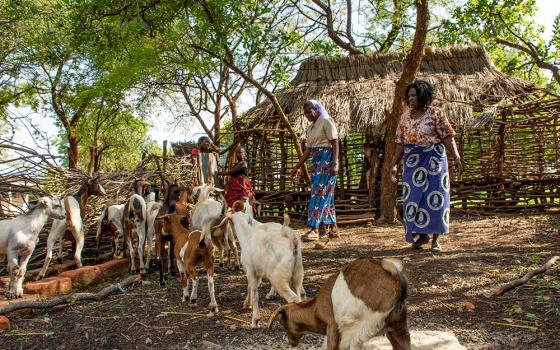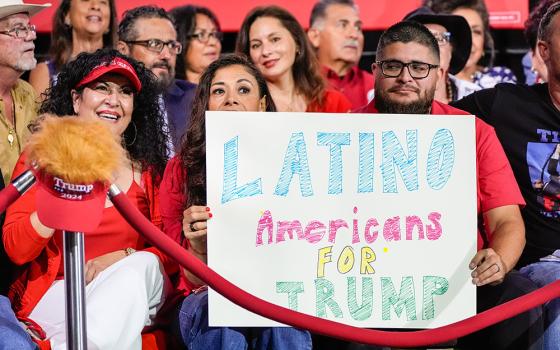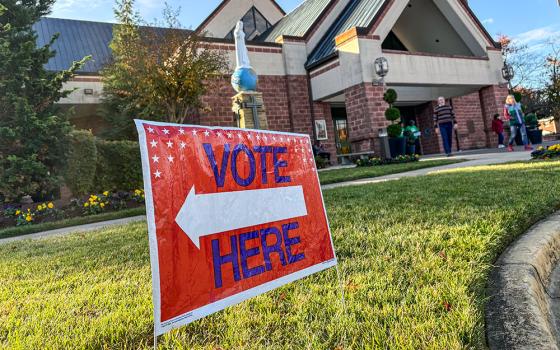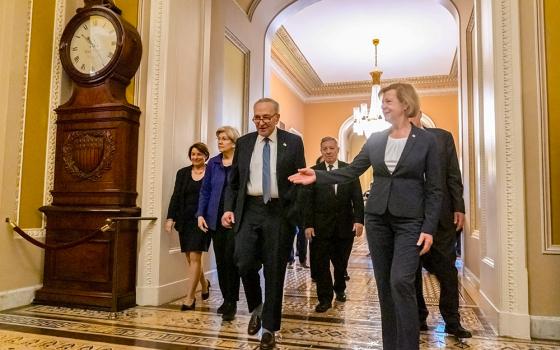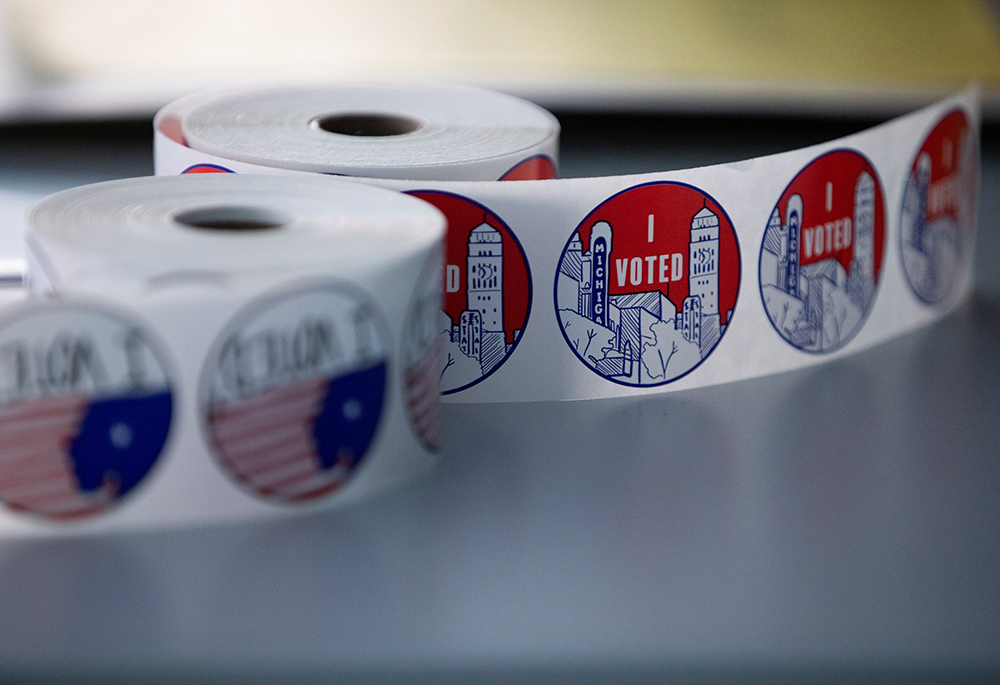
"I Voted" stickers are seen Sept. 24, 2020, in Ann Arbor, Michigan. (OSV News/Reuters/Emily Elconin)
There was a time, not so long ago, when dialogue between Americans with different political leanings wasn't a big deal. In 2024, U.S. politics have shifted into a realm that feels more akin to spiritual warfare. As the election nears, it's starting to resemble actual warfare, with fewer and fewer diplomatic options. Nonetheless, the concept of freedom remains core to American ideals, and is still championed across the political spectrum in one form or another. How might this common ground of freedom be interpreted and pursued in ways that are helpful for our current predicament?
Two different forms of freedom — empowerment and liberation — are tightly bound to the American dream and its darker reality. The United States is defined by this underlying duality of actions:
- Asserting the mantle of liberty for all;
- While simultaneously oppressing a huge portion of the population.
Collectively and individually, Americans must contend with these contradictions about true freedom if we hope to become a cohesive nation capable of attaining a more perfect union.
Freedom for …
First, let's turn to the idea of freedom as empowerment — the type of freedom associated with civil and human rights. This vision of freedom has all Americans empowered to lead lives of hope, lives oriented toward having what is needed to flourish and find fulfillment. Experiencing this freedom is about being treated with basic dignity, having good health or at least a means of care, having the ability to meet basic needs, having privacy and agency to make choices for yourself, and enjoying safety from harm.
We know that the U.S., since its founding, has had a checkered history that largely fell short of its ideals. It's likely that the sins of slavery, colonization and oppression contributed to the richness and strength of the new nation by limiting freedoms for others — particularly women and people of color.
National statistics demonstrate that this legacy, borne out over generations, continues to impact our current socioeconomic reality. For example, Federal Reserve Bank of St. Louis found that for the first quarter of 2024, white households still owned 84.4% of total family wealth, while Black households owned 3.4%.
The murder of George Floyd in 2020 heightened — in a very tangible way — the nation's awareness of the crushing impact this legacy has on communities, families and individuals living in the U.S. today.
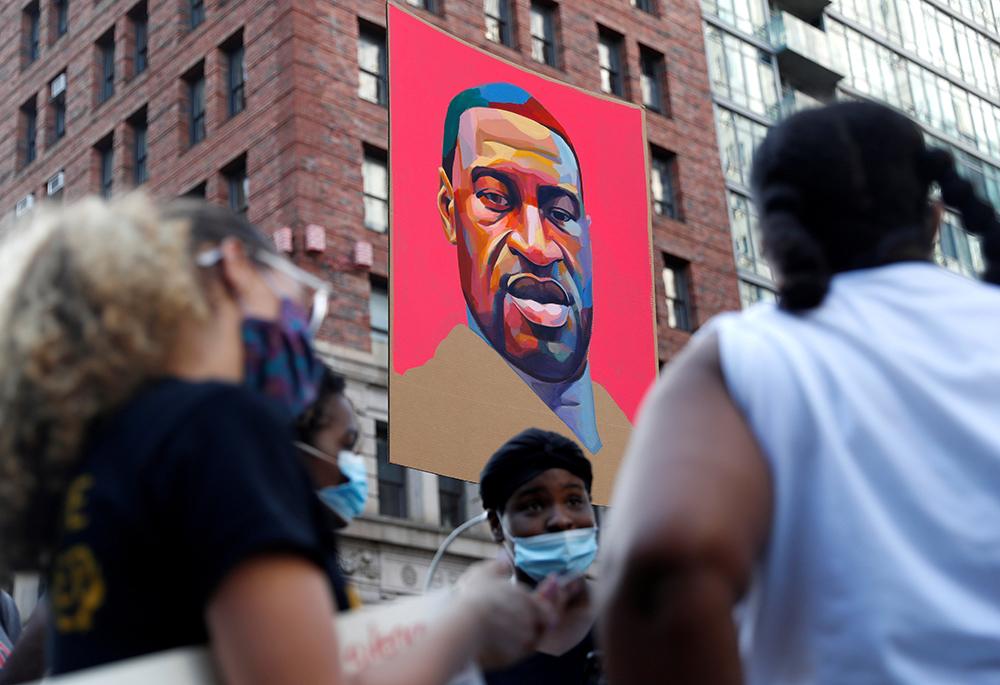
A portrait of George Floyd is seen in New York City during a protest against racial inequality June 8, 2020. (CNS/Reuters/Shannon Stapleton)
More recent history has seen 40 years of federal public policy choices that steered the nation's wealth away from families and communities, to a few extremely rich individuals and corporate coffers based on the theory that it would "trickle down."
Unrestrained profit motives and other complex economic dynamics impact education, health care, child care, housing and so many other aspects of daily life, limiting many Americans' freedom to live well. It is no wonder that middle-class and low-income Americans feel trapped in working poverty.
Additionally, the clear and present danger of climate change is seriously impacting the well-being of our youngest and endangering the lives of future generations. If trends are not reversed, those most vulnerable will have their futures robbed from them. It seems to me not so different from abortion, except for the added burden of surviving on a planet that has become unlivable.
Americans are losing the sense of empowerment needed to protect our collective home and resist forces that would make us commodities, consumers or economic burdens. It was this "freedom for" that defines the American spirit and instilled the creativity, inspiration and hope for this great experiment. The road ahead is bleak without this freedom.
Freedom from …
Turning to freedom as liberation, let's consider what it is that we need to be "freed from" to attain the more perfect union that our forebears envisioned. When we consider the shameful aspects of U.S. history, it follows that there was also justification at the time. I trust I'm not the only person wondering how Americans during slavery came to see it as a normal part of everyday life.
While the social context was dramatically different, it is basic human nature to face that kind of ugliness by adopting narratives to justify and mask it. The Catholic rationale was articulated in the Doctrine of Discovery, which was foundational for subsequent U.S. laws and policies. It became ingrained in the collective psyche as the young nation grew.
Those narratives, which so often played on fear, have morphed into aspects of the modern-day American mindset, identity and worldview.
As you consider the 2024 election, which of these psychological and cultural echoes of the past feel familiar: suspicion of authority, entitlement to resources, use of force, dehumanization of our neighbors, a need to be in control, an "us vs. them" mentality, denialism, and a sense of superiority?
We see that these tendencies are now bubbling to the surface in our national discourse. They create painful divisions among us, spark violent eruptions, and create national scapegoats.
Civic engagement is also part of our heritage, as a legitimate part of the call to hold the government accountable for shameful policies or choices. Nevertheless, the outrageous narratives, intimidation and violence that are now characteristic of this election season are appalling. The conspiracy theories that have been disproven repeatedly continue to circulate. Moreover, they blame and demonize innocent members of our communities, and are leading to harassment of civil servants, the press and peaceful demonstrators.
Advertisement
According to the Southern Poverty Law Center, or SPLC, while anti-government conspiracy theorists target government authority, their ideas are often rooted in "racist, antisemitic and sometimes nativist beliefs." As SPLC reports:
Conspiracy theories have long been a fixture in American political discourse, and today extremists continue peddling these narratives to cast doubt on democratic processes.
Identity-based politics tend to trap Americans in angry boxes, which ultimately results in toxic culture wars. Some researchers believe the motivations to believe conspiracy theories "are often related to social identity." On an individual basis, they fulfill the social need for belonging and for elevating one's in-group.
When political disagreements are perceived as personal threats, it becomes a spiritual sickness. Liberation from rigid identities — loosely holding them rather than clinging to them — is how we become a more charitable, humble and authentic people.
Our civic body is richer and more complex than the simplistic, partisan framework of Democrats vs. Republicans. Despite what the media seems to believe, new research demonstrates that there is a yearning for dignified, informed and respectful civil discourse among candidates who disagree.
So, when discerning who is most fit to lead us into the future — "the lesser of two evils," as Pope Francis has framed it — try using benchmarks like goodwill, integrity and humility as you size up the candidates. While policy is important, perhaps what our nation ultimately needs are leaders who empower us to create a better world and help us to not be driven by fear as we grapple with the serious predicaments of these times.


